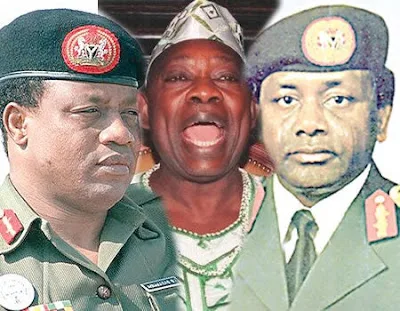A former Commissioner for Information in Edo State, Prince Kassim Afegbua on Sunday said one of the greatest mistake made by the late MKO Abiola was accepting to be part of the palace coup by the late Sani Abacha which ousted the Interim National Government, headed by the late Ernest Shonekan.
In an article titled ‘IBB: These Nefarious Inside Sources’, Afegbua also said it also bemusing that Abiola suggested some names to serve in the Abacha-led government.
He wrote “The truth must be told; right from Professor Humphrey Nwosu’s account of the June 12 debacle as captured in his book, Late Abacha featured as the main culprit. In fact, to get to the point of even going ahead to conduct the election was a herculean task for Professor Nwosu, followed by the traipse of counting the votes until the election was deemed to be inconclusive. It was a coup plot within several other coups. A factionalized military with different cells championing different interests, one trying to out-manouver the other in their desperate desires to gain control”.
“Late Abacha was allowed to swing things his way, because of the role he had played in the emergence of IBB as head of state ab initio. The soft spot rooted in IBB for him, because of the full fealty he showed in the coups of 1983, 1985 and the quelling of the April 1990 Orkar coup were parts of the reasons why IBB was “deliberately helpless” in checkmating him and his onslaught. Abacha mounted heavy pressure on IBB to allow him taste presidential powers; his push it appears was inexorable”.
“The idea of returning to civil rule was never in sync with late Abacha. He consistently told Prof Nwosu of the unpreparedness of the Electoral umpire citing security concerns in tones that conveyed his anger. Nwosu’s account finds correlation with the final position of IBB’s as aptly captured in his memoir, “these inside nefarious forces”… In essence, IBB wasn’t telling us anything new. Abacha was desperate for power, and he manipulated his friend until the friend capitulated; period!
“Such plots and counter-plots are the ingredients that dominate the struggle for power anywhere in the world especially under a military dispensation. Even in our democracy today, the scramble for votes to secure power is often fraught with similar condiments. The power game can only be understood by those who play and wield it. It is the reason why the country was alarmed that MKO fell for the palace coup that had his own imprimatur. After turning down the option of becoming the head of the interim government, which in hindsight would have been his easy access to power. Accepting to be part of late Abacha’s palace coup was his undoing. Ditto for jetting out of the country, thereby allowing Abacha the freedom to execute his plot; then going ahead to suggest some appointees in that government, is bemusing”.
“This power game is certainly a crazy stimulant; able to make men wild in their thoughts and actions. How could you have gone to bed with a man who never wanted June 12 election to hold in the first place? Power has its addictive properties; the more you look, the less you see. It is not served ala carte. It is a struggle between reality and promise. Even in contemporary democratic nations, the struggle for votes wears its own crown of thorns”.

